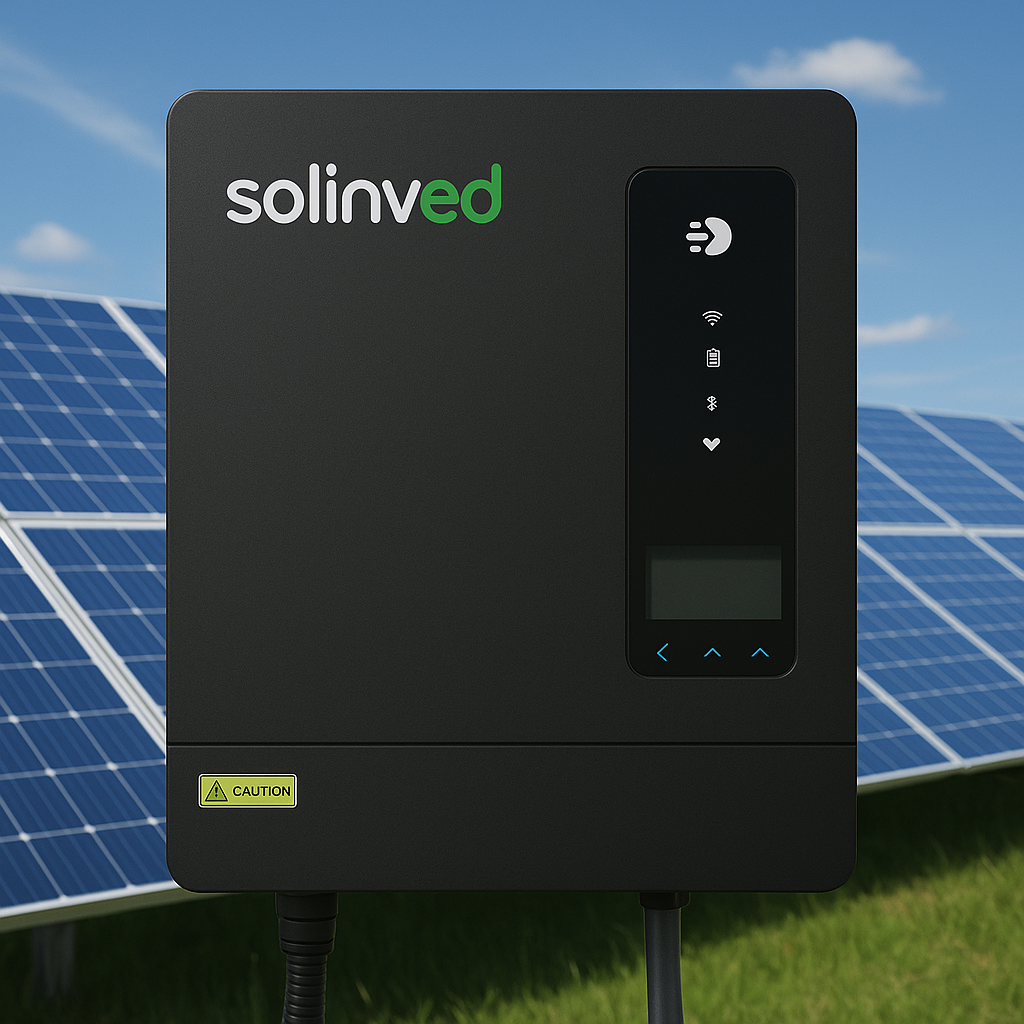


Inverters, one of the most important components in solar energy systems, convert direct current (DC) to alternating current (AC) to make solar energy usable. However, the efficiency of inverters is a critical factor that directly affects the overall performance of the system. The efficiency of the inverter affects many important elements such as optimization of energy production, longevity and security. In this article, we will provide a detailed explanation of the energy efficiency of inverter systems and examine ways to increase the performance of inverters in solar energy systems.
An inverter is an electronic device that converts direct current (DC) obtained from solar panels into alternating current (AC). In solar energy systems, solar panels produce direct current, but most domestic and industrial devices require AC current. Therefore, inverters in solar energy systems ensure that solar energy is integrated into the grid and operate electrical devices in homes.
Inverters are not only responsible for energy conversion; they also play an important role in terms of energy efficiency. A good inverter should convert the energy obtained from solar panels to AC with the highest possible efficiency and minimize energy loss.
Inverter efficiency refers to how efficiently the inverter converts the direct current received from the panel into alternating current. High-efficiency inverters convert the energy produced by the panel with less loss. This means more electricity production and less energy loss.
Inverter efficiency generally ranges from 90% to 98%. High-efficiency inverters collect more energy from the panels in all sunlight conditions. Efficiency may vary depending on the design of the inverter, the components used, and operating conditions.
There are many factors that affect the energy efficiency of inverters. Here are some of them:
1. Inverter Type
Inverters come in different types and each type offers a different efficiency rate:
Pure Sine Wave Inverters: Provides high efficiency. Works with the electrical grid and is usually preferred for sensitive devices.
Modified Sine Wave Inverters: Offers lower efficiency but is more affordable. Suitable for simple devices.
Micro Inverters: A separate inverter is used for each panel so that shading or panel failures do not affect the efficiency of the entire system. Micro inverters usually provide higher efficiency.
String Inverters: Usually used in larger systems and optimize the energy production of a specific group of panels (string).
2. MPPT Technology
MPPT (Maximum Power Point Tracking) is a technology used to ensure that inverters can get the maximum energy from solar panels. MPPT technology continuously optimizes the panel voltage and current along with the variability of sunlight. This technology increases the efficiency of the inverter, allowing for more energy production.
The biggest advantage of MPPT technology is that it optimizes the efficiency of the panels according to different light conditions. For example, when the direction of the light from the panel changes or when the weather is cloudy, the MPPT inverter detects the maximum power point of the panel and prevents energy loss.
3. Operating Temperature
The operating temperature of the inverters has a direct effect on efficiency. Inverters can operate with lower efficiency at high temperatures. Therefore, the cooling systems of the inverters are very important. In addition, the temperature of the environment where the inverters are located can also affect efficiency. For example, high temperatures in the summer months can cause the inverter to operate less efficiently.
4. Inverter Quality and Technology
High-quality inverters provide higher efficiency than low-quality inverters. These inverters perform better energy conversion using advanced components and smart software. In addition, the brand and manufacturer of the inverter can also affect quality. A reliable brand usually offers inverters with longer life and more efficiency.
5. Panel and Inverter Compatibility
There should be a match between solar panel capacity and inverter capacity. If the panel capacity is much higher than the inverter capacity, the inverter may not be able to process all the energy, which will lead to loss of efficiency. On the other hand, too much inverter capacity can also increase the cost. Therefore, choosing the right inverter is critical to system efficiency.
You can pay attention to the following suggestions to increase the efficiency of inverters:
1. Choosing the Right Inverter
Choosing the right inverter for your solar energy system directly affects efficiency. Choosing high efficiency inverters that are compatible with high efficiency panels such as monocrystalline panels will increase the efficiency of your system.
2. Use MPPT Technology
MPPT technology allows the inverter to follow the maximum power point. In this way, the energy received from the panel is used more efficiently. Using an MPPT charge controller increases efficiency, especially in low light conditions.
3. Use a Good Cooling System
It is important to use a good cooling system to prevent inverters from overheating. Natural cooling or fan cooling systems can help inverters work more efficiently.
4. System Maintenance
Regular maintenance ensures that inverters work efficiently. The efficiency of the system can be increased by cleaning the inverter filters, checking the cooling systems, and updating the software.
Inverters are one of the basic components of solar energy systems and play an important role in energy efficiency. An efficient inverter converts the energy received from the panel with minimum loss and provides maximum benefit from solar energy. MPPT technology is one of the most important innovations that increase the efficiency of inverters and this technology optimizes the efficiency of the panel. In order to make your solar energy system more efficient, it is very important to choose the right inverter and pay attention to factors such as maintenance and cooling.
Choosing a good inverter provides long-term energy savings and sustainable energy use. Increasing the efficiency of your solar energy system will help you reduce your energy costs while contributing to the environment.